- Home
- Donald Hamilton
The Two-Shoot Gun Page 2
The Two-Shoot Gun Read online
Page 2
"You asked for my authority, stranger!" Mort said. "Here it is! Hold on to those mules now, and keep your hands off that shotgun!"
Burdick hauled the team to a halt. A rider to one side called, "This is the wagon, all right; look at the tires! And there's the mule we've been tracking along the road, with the cracked shoe."
Jack Mort said, "All right, Randy, open her up and take a look. See who's hiding inside, but watch yourself. If it's the man I think, he'll come out shooting." He looked sharply at Burdick, and cocked his pistol. "I said, keep your hands off that doublegun! I can kill you before you get it turned around—"
"Perhaps," said Burdick, and the cold shape of the Purdey was familiar under his hands. He was smiling a little. He could feel the blood pounding in his ears. "Perhaps," he murmured, "and perhaps not. It would be a bit of a gamble, wouldn't it, Mr. Mort? You'll have to aim your pistol with some care to make certain of a lethal hit; all I have to do is point my piece in your general direction. The spread of the shot charge will take care of any slight discrepancies.... Shall we try it?"
Very slowly, watching the rider before him, Burdick lifted the shotgun from his knees. Mort's eyes narrowed; otherwise the man made no move. Never taking his eyes from Jack Mort's thin, dark face, Burdick swung the weapon deliberately until the muzzle was aimed in Mort's direction. There was, for a moment, complete silence, in which the smooth double click of the handhoned locks sounded very loud, as he brought the hammers back to full cock. All the while he was aware of young Tom Justice sitting his horse near by, the ivory-handled revolver poised in his hand.
Burdick spoke to Mort in a gentle voice. "When that man of yours opens the door of my wagon, Mr. Mort, I'll shoot you."
"Listen—"
"That's not a threat. It's a statement of fact. This wagon is my property. I do not tolerate unauthorized interference with my property, Mr. Mort. When that door opens, this gun fires."
Tom Justice had kneed his mount a little to one side. He called, "Let me take him, Jack. I can pick him off like a—"
"Shut up, kid!" Mort said. He looked at Burdick, frowning, as if he were seeing something he recognized very well, that he had not, however, expected to find here. He drew a long breath and, slowly and carefully, lowered the hammer of his pistol and returned the weapon to its holster. "All right," he said softly. "All right. My apologies, sir. Randy, you get the hell away from that wagon."
"But—"
"Get away from it, I said!"
Tom Justice cried sharply, "Jack, what the hell—"
Mort turned on the younger man. "I'm still foreman of Flying V, kid, until your dad kicks me out and gives you the job. Now put up your gun and get the hell out of here. That goes for all of you. Ride!" He sat watching, a saturnine and brooding figure, as they wheeled their horses and spurred away. Then he urged his mount a little closer, and glanced at the name on the side of the wagon. "Your name is Burdick?" "Yes," Burdick said. "Alexander Burdick."
"Thank you," Mort said. "I'll remember it. Good day, sir."
He looked at Burdick for a moment longer with that kind of puzzled recognition in his eyes; then he nodded curtly and rode away. Burdick found that his mouth was quite dry, and that his hands were damp with perspiration. Almost, he thought, it almost happened, then. What did that man see in my face?
He sent the mules forward and swung them onto the plaza. When he was. well beyond the corner, he stopped, set the brake, and walked quickly around to the rear of the wagon, still holding the shotgun. He pulled the door open, to look directly into the muzzle of Lou Grace's pistol.
3
The blond man grinned and winked at Burdick. He put his head out cautiously, examining the quiet plaza for possible enemies; then he holstered his weapon and dropped lightly to the ground. He stood with his hands on his hips, regarding Burdick with smiling respect. "Well, if you aren't a ringtailed catamount in sheep's clothing, Professor!"
Burdick said evenly, "Get your belongings out of my wagon, Mr. Grace. If you had to steal a ride, why didn't you at least have the good sense to slip away as soon as I stopped?"
Grace laughed. "It was a miscalculation. I was kind of hoping you'd take me clear to Romero's feed barn, so I could get a horse without displaying myself around town.
Adolfo Romero's a good friend of mine, which is why I mentioned his name, back there on the hill." He was still studying Burdick carefully. "Tell me, as a matter of curiosity, how long have you known I was back there?"
Burdick said, "About thirty seconds. Since I opened the door and saw you. Those men seemed so positive there was someone inside, I thought I had better investigate."
Grace's mouth opened foolishly; it was the first time Burdick had seen the blond man visibly disconcerted. "You mean you didn't know I was back there when you bluffed Jack Mort into—"
Burdick said coldly, "I was not bluffing. I saw no reason why I should permit a band of armed humans to invade what is, after all, the only home I own. If I'd known you were hiding there, I'd probably have let them have you. I don't like to be tricked, Mr. Grace."
The blond man flushed; then he grinned his infectious grin. "My apologies, Professor; but a man can't burden himself with too many scruples when his life's at stake He raised his head at the sound of approaching hoofbeats, reached into the wagon, and drew out his saddle, swinging it to his shoulder. "Well, I'm much obliged. Oh!" He turned back and grabbed for something else in the wagon and, laughing, held it out for Burdick to see: the three quail. "I almost forgot my supper! Again, much obliged, Professor. If you need me, tell Romero; he'll pass the word along. Or Laura Nelson at the hotel, in a pinch."
Burdick frowned. "Why should I need you?"
"Why," said the blond man cheerfully, "you've taken sides against Dan Justice, my friend. In this valley that constitutes a capital crime, punishable by death."
Burdick watched him go swiftly out of sight into the alley between two nearby buildings, bearing the big stock saddle as if it had no weight at all. A moment later, a single rider, whistling softly to himself, came onto the plaza at a walk. He turned toward Burdick and rode past through the patchy shade of the overhanging trees. A heavyset individual with a ragged mustache, he seemed to pay no attention to Burdick or the wagon at the side of the street, nor was he one of the men Burdick had encountered earlier—but the brand on his bay horse was the same as that carried by their mounts: a large letter V decorated with crude wings.
Burdick climbed into the wagon and threw out a small carpetbag. Emerging again, he closed the wagon and, with the shotgun in one hand and the bag in the other, crossed the shaded plaza to a sprawling building with a sign in front identifying it as the Territorial Hotel. He did not look back in the direction the whistling horseman had taken. He walked between two old men seemingly asleep on two of the weather-beaten wooden chairs with which the veranda was well provided, and on into the cool dusk of the building. When he struck the bell, a tall, blond young woman in a blue gingham dress came out of the rear of the hotel and slipped behind the desk.
"I'd like a room," Burdick said.
"For one night?" the girl asked. "Or more than one night?"
"Does it make a difference?"
She smiled. "A man can put up with anything for one night; but if you're staying longer, I'll give you one of our better rooms."
He asked, "Is your name Nelson?"
She looked at him quickly, her smile dying. "Why, yes," she said warily. The instant defensiveness was revealing; clearly experience had taught this girl to expect little good from life.
"My name is Burdick," he said, "Alexander Burdick. If you have time later on, I'd like to talk business with you."
"Business?" "I'm a photographer. I might be interested in buying the gallery just off the square—plaza, I guess you call it here. Nelson's gallery. I was told to get in touch with you." She said, "It's my father's place. But I don't think I want to—"
He glanced toward the open door. "Give it some thought," he said. "I c
ould give you a fair price. Now you'll have to excuse me; I want to see to my team." "I can tell you right now that I'm not—"
He glanced toward the sunlit plaza again, and said, "I'd rather discuss it later, if you don't mind."
"Very well," she said, a little stiffly. "But my answer will still be the same. Your room is number seventeen, down that hall, Mr. Burdick. Here's the key."
He put the key into his pocket, picked up the shotgun, pressed the latch to open the piece, and glanced at the shiny brass heads of the unfired shells. He closed the weapon, and walked quickly outside, but paused on the veranda, looking across the plaza. He could barely make out the shape of his wagon through the intervening foliage. Not much grew in this dry climate, he reflected; but when it did, properly watered, it apparently made up for lost time. He strode down the veranda to the left, and struck across the plaza at an angle until he could see the wagon clearly. The bay horse with the Flying V brand was tied near by, and the rear of the wagon was open.
Burdick walked forward slowly, judging the distance. At slightly less than fifty yards, he stopped to wait. Presently the man with the ragged mustache put his head out of the wagon, looked around furtively, and eased his considerable bulk to the ground. He started for his horse. When he was safely clear of the wagon, Burdick fired.
The charge of shot, aimed low, caught the man in midstride. He. leaped convulsively into the air, howling with pain and clapping his hands to the perforated portions of his anatomy. Then, striking earth again, he clawed for the pistol at his hip. Burdick gave him the second barrel, still holding low. The pistol spilled to the ground, and the man ran for his horse. Burdick broke the shotgun swiftly, reloaded, and snapped the gun closed. The man was riding away now, bestriding his mount awkwardly in his effort to make his contacts with the saddle as light and infrequent as possible. Burdick waited 'for the range to lengthen to the point where the shot would merely sting the horse without penetrating into the flesh; then he fired a third time. The bay horse reared and bolted, with the rider clinging desperately to the saddle horn.
Burdick watched horse and rider rush out of sight; he found that he was breathing deeply, as if he had run a long way. He reloaded the discharged chamber of his weapon, and walked forward to pick up the fallen revolver, which he thrust under his belt. Then he closed up the wagon and freed the team. Accustomed to the sound of the shotgun, after two thousand miles in his company, the mules had paid no attention to the firing. Burdick backed the wagon into the street. There were people in the plaza, now, drawn by the reports of the gun, watching him. He paid them no attention, but sent the mules ahead at a walk.
Ahead, a man wearing a badge emerged from a building with barred windows and stepped out into the street. Burdick reined in.
"I'm Floyd Greer, marshal of this town," the man said. "I'll take that shotgun, son."
Burdick looked down at him from the wagon seat. The marshal was well past middle age, short and wide, with a military carriage that had, over the years, become a kind of roosterlike strut through the necessity of balancing the protruding paunch. There was no gray in his black hair, or in the thick, drooping mustache, the bushy overhang of which totally concealed his mouth. He wore a pistol at his hip, but his hands were empty.
Burdick said, "The man was rifling my wagon, Marshal. I think I have the right to protect my property."
"Yes, son," the marshal said, "but you have no right to kill anybody in my town."
"Kill?" said burdick. "Why, Marshal, how could I kill anybody with birdshot at fifty paces?"
There was a pause. Little wrinkles of reluctant amusement formed about the corners of the stout man's small eyes. The marshal cleared his throat. "I'll look up the law on the point, son," he said, "and determine at what range a shotgun ceases to be a deadly weapon, legally speaking. In the meantime All right, all right, drive on!"
4
Adolfo Romero was a square, leathery man with thick gray hair that contrasted sharply with his dark brown face. It was a mobile face that showed tremendous relief and pleasure as Romero watched Lou Grace drop his saddle in a corner of the barn and straighten up wearily. "Thank God you are safe,' Señior Grace," Romero said. He hesitated. "Martinez was here."
"Singing dirges as usual, no doubt," Grace said dryly. "I suppose he had me dead and buried."
"He was distressed."
"That carefree fool almost got us all killed. He won't make plans. 'Manana, manana, tonight we drink and be happy, no?' And when somebody else makes plans for him, he won't stick to them. That outfit of his has about as much discipline as a herd of jackrabbits. And then things go wrong and Martinez's heart is broken and he busts out crying." Grace sat down on an upended box and started to pull off his boots, but decided against it, since there seemed to be a good chance he would not be able to get them back on again. He looked up. "Did he have anything particular to weep about, besides my gallant death while leading the pursuit away from my beloved compadres?"
"Yes, he lost a man. The horse went down and the man was captured. They took him back to Flying V and—" Romero paused.
"And what?"
"They hanged him, Señior. From a tree in the bosque at the upper bend of the river."
Grace pursed his lips. "So. Dan Justice is getting real tough again, after all these years. It shows he must be starting to hurt a little." The blond man drew a deep breath. "That vaquero must have talked before they strung him up, Adolfo. They knew who they were after, or they wouldn't have stuck so tight to my tracks. Old Dan's been wanting to catch me redhanded for a long time. Damn Martinez and his lighthearted ways! I just hope this wakes him up to the fact that he's not a gay caballero playing some kind of a jolly game just so he can twirl his mustachios at the señioritas as he goes by, and hear them sigh and whisper, 'Ah, there rides Martinez, the rustler. Qué hombre!' It's about time Martinez realizes that he's fighting for his life like all the rest of us in this valley!"
Romero said gently, "A man is dead, Senor Grace. Martinez is distressed. J said no more than that."
Grace looked up at him and, after a moment, grinned. "Reckon I'm growling like a mean dog tonight, eh, amigo? My apologies. It was a hell of a mixup, and somebody was asleep who should have been awake, and they caught us with our pants down; and I had to pack that damn saddle five miles after my horse gave out. . . Well, chalk up a point for Dan Justice. He's got his herd back and I've got blisters on my feet—but I still think we're on the right track, Flying V may be above the law, but it's not above the banks; and I happen to know old Dan's stretched his credit just about as far as it'll go. We've got to keep hitting him in the pocketbook."
Romero shook his head unhappily. "I do not like it. For Martinez it is all right, but I do not like to see you outside the law, Señior Grace. There must be some other way to fight."
Grace stood up stiffly. "If you find one, let me know. I haven't come up with one yet, and I've been working on it since the day they shot down Dad and left me standing by his body, That's eleven years ago this fall; I was a boy of thirteen at the time."
"I remember," Romero said. "But—" He checked himself, put his finger to his lips, and stepped through the big open door to take a look outside. He turned. "A wagon comes."
"Drawn by two big mules? A closed wagon, like a hearse?"
"Si."
"I know the man who drives it,'? Grace said. "As a matter of fact, I owe him my life. Take care of him. And, Adolfo . . ."
"Take a good look at this man. His name's Burdick. He's tougher than he appears at first glance. Let me know what you think of him."
5
Walking back down the street from Romero's feed barn, after making sure that his team would be properly cared for, Burdick had a dreamlike feeling of unreality, born of weariness and reaction. He was suddenly very conscious of the shotgun in his hand and the confiscated pistol in his belt.
He found himself, for some reason, remembering the exact shape and feel of the small, singlebarreled fowling piece his
father had ceremoniously put into his hands on his tenth birthday, with the words: Here it is, as I promised you. Now you hold a man's life in your hands. One moment of carelessness can make you a murderer, Alex. Don't ever forget it.
They'd had a fine time that fall. There had been quail in the fields and ducks in the marshes and rabbits everywhere. The following year his father had gone to war, and had never come back. Alexander Burdick had prayed for the war to last long enough for him to take part in it—a boy's prayer—but it had ended before he was fifteen; so he had never, before today, aimed a weapon at another human being, except just once....
He put the thought aside, closing it out of his mind. Finding himself passing the dilapidated and boardedup building of Nelson's Gallery, he paused to look at it, visualizing the repairs that he would make if he could talk the girl at the hotel into selling, and the sign that he would put up. He took a slow turn around the place. When he came back to the street, there was a wagon standing in front of the gunsmith's shop next door—one of the durable, springless wagons much in favor in this western country, called buckboards. There was a young woman on the cushioned seat, which was also equipped with springs to compensate in some measure for the deficiencies of the vehicle's undercarriage. She was wearing a darkgreen silk dress and a small, fashionable hat; and the low sunlight struck reddish glints from her smoothly coiled dark hair. She was having some difficulty holding the nervous team in check. She turned her head and called, "Hurry up, Sally! Just leave it there and come on; Mr. Deckerhoff will know what to do with it."
Another feminine voice answered from inside the shop, "I'm coming! Hold your horses!"
The girl on the wagon said dryly, "Yes, Kitten, but I'm ruining my good gloves doing it."

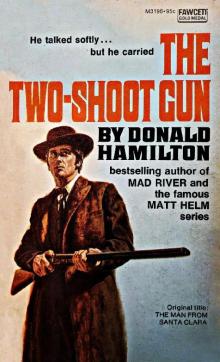 The Two-Shoot Gun
The Two-Shoot Gun Mad River
Mad River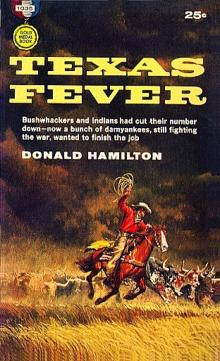 Texas Fever
Texas Fever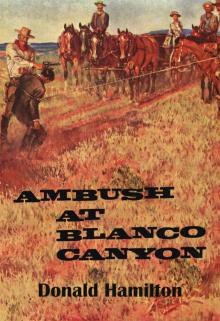 Ambush at Blanco Canyon
Ambush at Blanco Canyon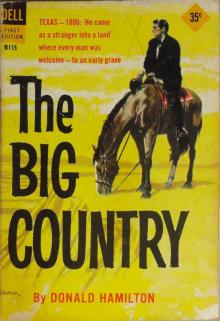 The Big Country
The Big Country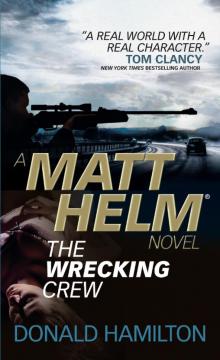 The Wrecking Crew
The Wrecking Crew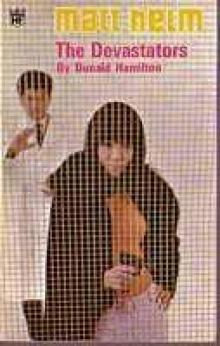 The Devastators mh-9
The Devastators mh-9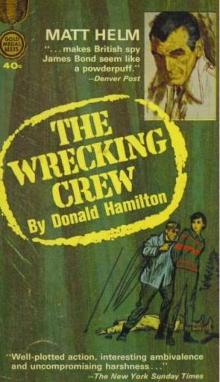 The Wrecking Crew mh-2
The Wrecking Crew mh-2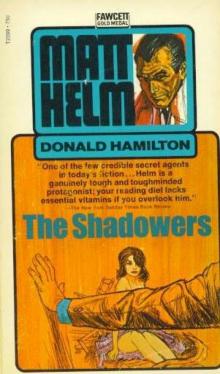 The Shadowers mh-7
The Shadowers mh-7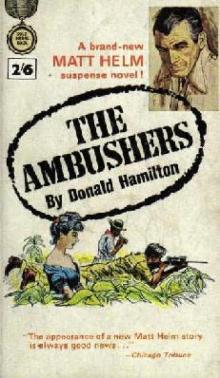 The Ambushers mh-6
The Ambushers mh-6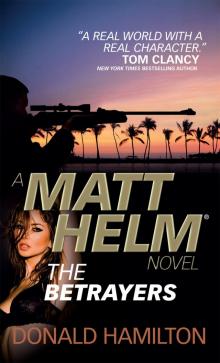 The Betrayers
The Betrayers The Terrorizers
The Terrorizers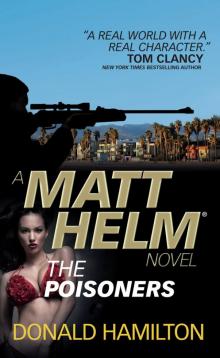 The Poisoners
The Poisoners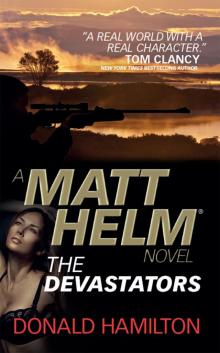 The Devastators
The Devastators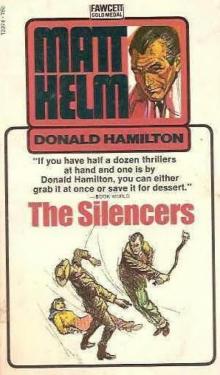 The Silencers mh-5
The Silencers mh-5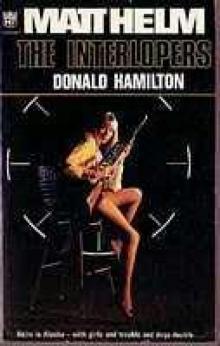 The Interlopers mh-12
The Interlopers mh-12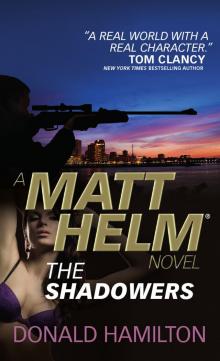 The Shadowers
The Shadowers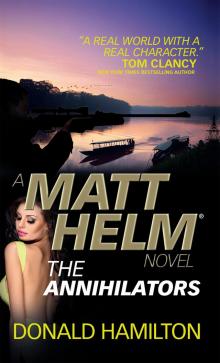 The Annihilators
The Annihilators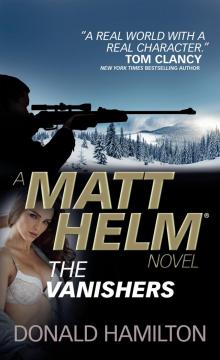 The Vanishers
The Vanishers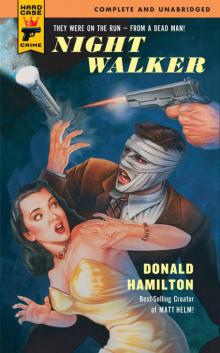 Night Walker
Night Walker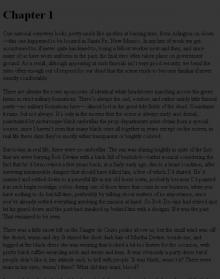 The Revengers
The Revengers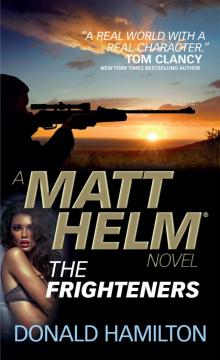 The Frighteners
The Frighteners The Infiltrators
The Infiltrators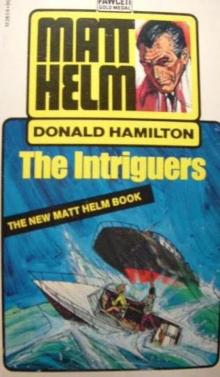 The Intriguers mh-14
The Intriguers mh-14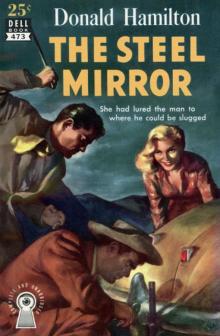 The Steel Mirror
The Steel Mirror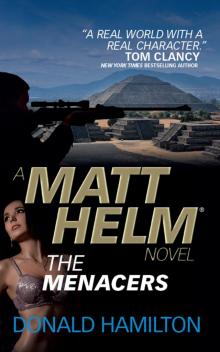 The Menacers
The Menacers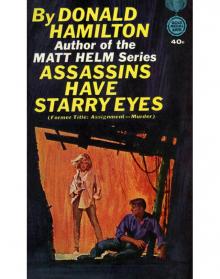 Assassins Have Starry Eyes
Assassins Have Starry Eyes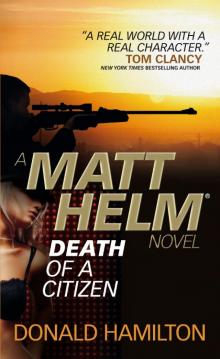 Death of a Citizen
Death of a Citizen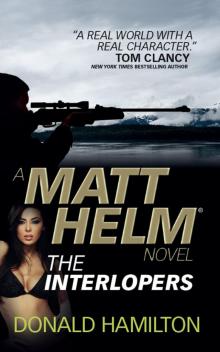 Matt Helm--The Interlopers
Matt Helm--The Interlopers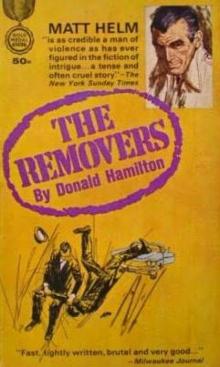 The Removers mh-3
The Removers mh-3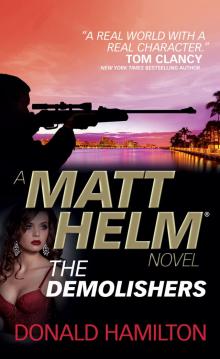 The Demolishers
The Demolishers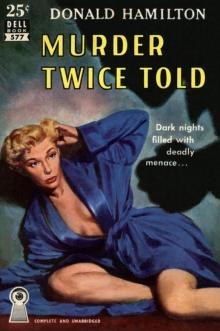 Murder Twice Told
Murder Twice Told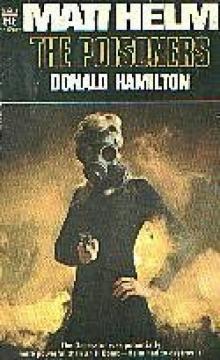 The Poisoners mh-13
The Poisoners mh-13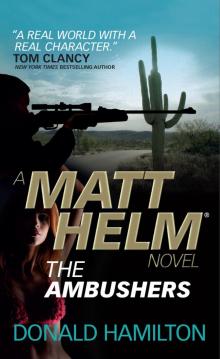 The Ambushers
The Ambushers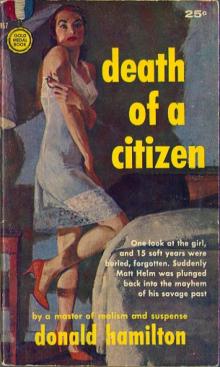 Death of a Citizen mh-1
Death of a Citizen mh-1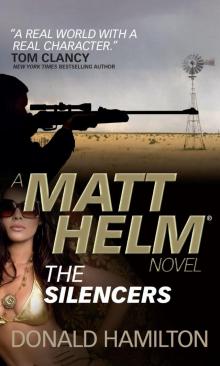 The Silencers
The Silencers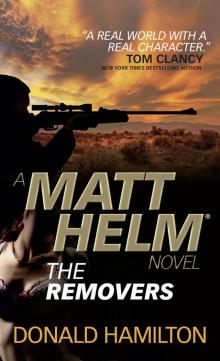 The Removers
The Removers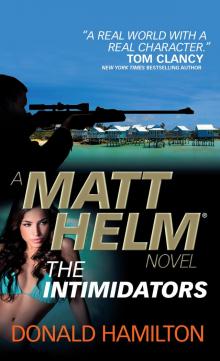 The Intimidators
The Intimidators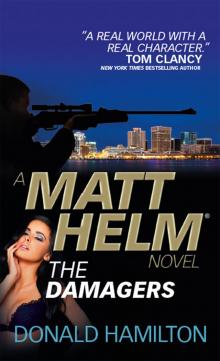 The Damagers
The Damagers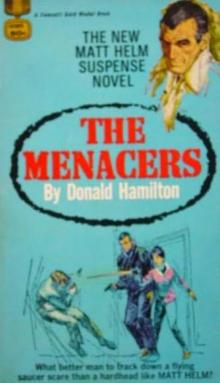 The Menacers mh-11
The Menacers mh-11 The Retaliators
The Retaliators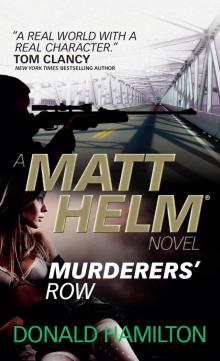 Murderers' Row
Murderers' Row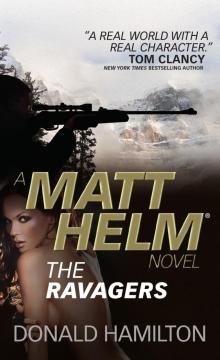 The Ravagers
The Ravagers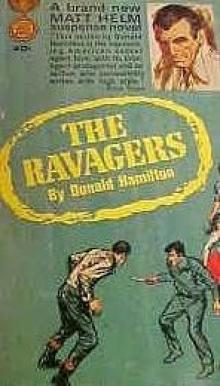 The Ravagers mh-8
The Ravagers mh-8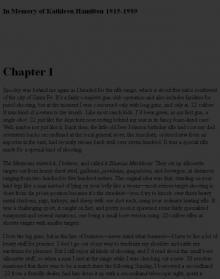 The Threateners
The Threateners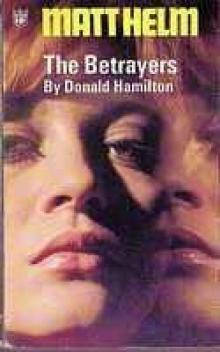 The Betrayers mh-10
The Betrayers mh-10